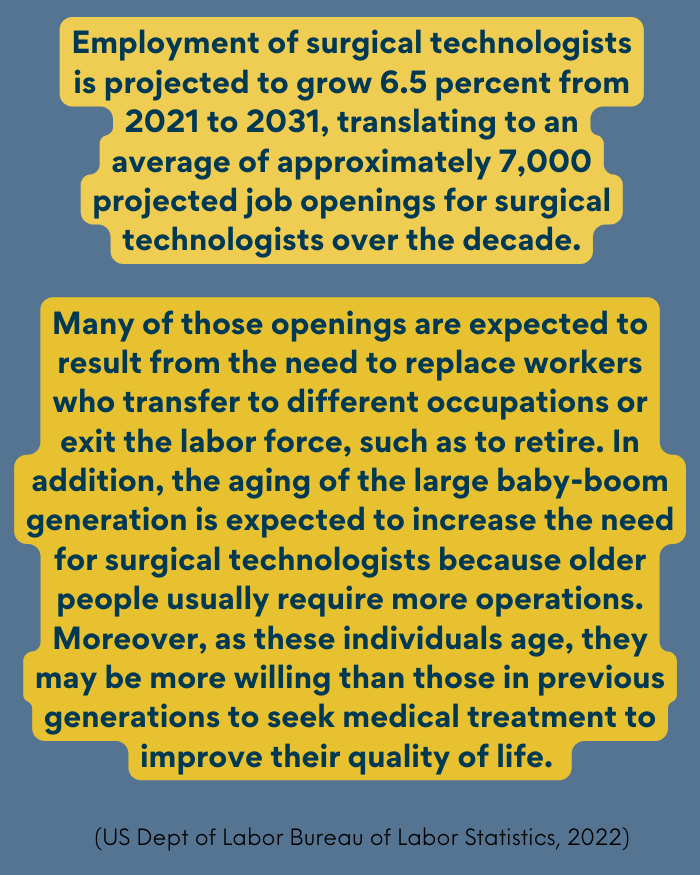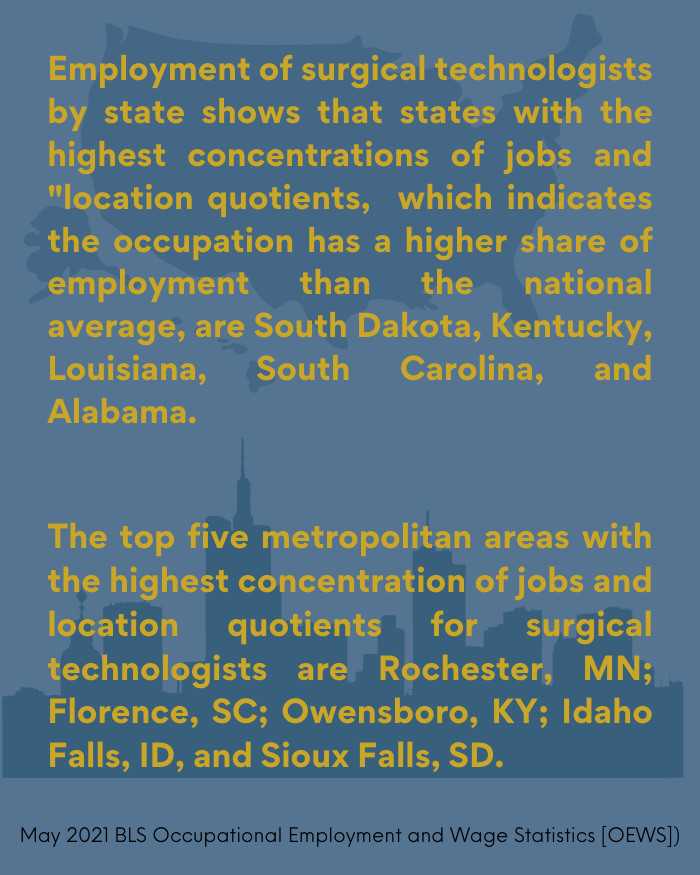Clinical Nurse Educator Renegade (Ren) Scott-Feagle, MSN/Ed, BSHS/M, RN, CNOR, and Traveling Certified Surgical Technologist Silviana Vina, BS, CST, who worked together as colleagues at the University Medical Center of Southern Nevada (UMCSN) in Las Vegas, Nevada, share their thoughts on the shortage of surgical technologists and their crucial intraoperative role.
Ren Scott-Feagle (RSF): Silviana, thank you so much for asking me to contribute to this article.
I strongly believe that surgical technologists are an extension of the surgeon’s hands, and am concerned that along with the shortage of nearly all categories of healthcare workers, operating rooms across the country are struggling to recruit, fill, and more importantly to retain experienced surgical technologists.
Many factors have led to the dearth of surgical technologists including a lack of understanding about the crucial intraoperative role of the surgical technologist, difficulty for working adults to access educational programs during evenings and weekends, and a lack of exposure to high school students launching into the job market. These contributing factors are added to the challenges faced by all healthcare workers across the board including the toll taken by burnout, lack of recognition, salary and benefit issues, and a perception that the field lacks the opportunity for career growth.
Silviana Vina (SV): Thank you, Ren, for your support of surgical technologists and taking the time to weigh in on this critical issue. I agree, that the shortage of surgical technologists is due to a combination of factors, that were most certainly exacerbated by the pandemic. While it is difficult to predict the future, projections from reliable sources expect the need for qualified surgical technologists to continue to grow.
SV: Prior to the pandemic we saw hundreds of surgical technology students graduate from their programs to find many positions required minimum scrubbing experience of a year or more. Depending on their proficiency, professionalism and other factors, some grads got jobs right away, while some struggled. When the pandemic hit, healthcare facilities were struggling to fill positions and retain qualified professionals.
RSF: Exactly. The familiar ‘pipelines’ from surgical technology schools that fed hospitals slowed, while hospitals struggled to deal with the surge in Covid-positive patients and employees. Prior to the 2019 and the onset of pandemic, there was already a significant shortage of healthcare workers, including surgical technologists. However, the pandemic most certainly exacerbated the shortage as many surgical technology schools had to halt both face-to-face classes and also clinical rotations in the interest of contagion prevention. In order to maintain the case flow, many hospitals began using their Registered Nursing staff to scrub in, removing nurses from direct patient care.
SV: As a former program director of an accredited surgical technology program, and now a traveling CST, I feel like I have a unique perspective, and I would like to elaborate on one of the contributing factors to the ST shortage that you mentioned previously – the perception that the field lacks the opportunity for career growth.
The graduate placements for my former program and other accredited programs were taken to an all-time high during the pandemic. New grads were hired immediately – post-grad experience was now less important than before. We also saw hospitals doing everything possible to attract applicants: sign-on bonuses, referral bonuses, relocation packages higher than before, pay rates reaching another all-time high.
Traveling agencies almost doubled their weekly rates just to facilitate the high demand and the huge shortage of surgical technologists on the market. They are also very interested to have you sign up again and again, maximum usually being a total of nine months, depending on the traveling agency you work for. The supply and demand started to be totally different than before the pandemic hit. For example, SSM Saint Louis University Hospital is a non-profit, teaching hospital. Their OR, like many others, is extremely busy with ortho, neuro, general, plastics, ENT, urology, peripheral vascular, cardiac transplants and is a Level I trauma center. Their staffing in the OR is comprised of about 80% travelers – techs, nurses, even anesthesiologists – when did that ever happen before? They fight to keep you as a surgical technologist and even take you if you are a first-time traveler. With the orientation being only one week, they basically let you fly on your own and you must take call right away too.
That being said, I believe that now more than ever, the education of the surgical technologist is critically important – accredited programs require that students have lab time to practice their skills, in conjunction with supervised clinicals, to ensure that a newly-graduated surgical technologist is proficient in the entry-level surgical technologist first scrub role.
RSF: I completely agree. Surgical technologists are an extremely important part of the surgical team. They have to have extensive medical knowledge to be able to anticipate what a surgeon needs. The education of these professionals must have a high standard, including following nationally approved accreditation standards and curriculum.
SV: To those who may be considering the profession of surgical technologist, you may ask – is surgical technology worth pursuing? Well, do the math and set your priorities in order first. The national average lacks enough professionals in this field and the demand has reached the highest high of all time. The benefits, job stability and job opportunities are better than ever. A traveler surgical tech can now expect to average between $1,200 to $4,200 per week depending on the hospital, state, even weather…yes, if you go to Hawaii during the winter, you will get lower rates but if you go to Boston for example, you will get higher rates because people do not want to deal with freezing temperatures, snow and high cost of living. Have cardiovascular experience and you will not go below $2,500 per week. A traveling scrub tech’s annual income can easily reach the six-figure area now, when before the situation was different.
Yet no matter the pay, you will get to be part of one of the most invasive branches of medicine, and work with highly educated, reliable, trustworthy, amazing healthcare professionals. You get to grow as an individual and appreciated life and health differently. Yes, you will be tired at the end of your shift, but your patients are counting on you and your integrity, knowledge, and willingness to make a real difference.
Renegade (Ren) Scott-Feagle, MSN/Ed, BSHS/M, RN, CNOR, is the Clinical Educator for the Perioperative/Specialty Services Division at University Medical Center of Southern Nevada (UMCSN) in Las Vegas, Nevada. As a Registered Nurse with nearly 30 years’ experience in palliative care, hospice, geriatrics, HIV/AIDS, and perioperative nursing. She has lead initiatives for improved patient safety, value analysis/supply chain, regulatory compliance and Joint Commission survey preparation, and disaster management. Scott earned a Certificate of Mastery as a Surgical Services Educator, serves as a BLS/ACLS instructor, leads training on Bioterrorism/WMD, and provides education related to surgery for medical students and residents at the University of Nevada- Las Vegas. Her work in perioperative nursing has been published in nursing publications, and her research on the Use of ECRAs vs RACE for a Fire Response Mnemonic in Surgical and Procedural Areas won in the Clinical Innovation category at AORN’s Annual Conference & Expo multiple years.
Silviana Vina, BS, CST, has been a CST for more than 20 years and currently is a Traveling Certified Surgical Technologist at Aya Healthcare. She has a passion for education, spending 10+ years serving as surgical technology instructor, clinical coordinator, and program director, during which she spent time volunteering in many areas of the local homeless shelter and involving surgical technology students in giving back to the ones less fortunate. She earned her Bachelor of Science in Business, Management and Marketing from Capella University and her diploma in surgical technology from Glendale Career College. She is an active writer and contributor on ARC/STSA’s volunteer newsletter Editorial Advisory Board and serves on the NBSTSA’s Exam Review Committee and as an NBSTSA item writer.


